Monitoring Contracts
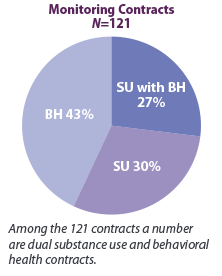 PHS maintains ongoing oversight of approximately 120 physicians and medical students with monitoring contracts. This number represents a slight increase from prior years. Of note is that PHS recommends a monitoring contract to approximately 25% of those referred each year. Most individuals who complete assessments without a recommendation of monitoring are referred to other resources for support and treatment.
PHS maintains ongoing oversight of approximately 120 physicians and medical students with monitoring contracts. This number represents a slight increase from prior years. Of note is that PHS recommends a monitoring contract to approximately 25% of those referred each year. Most individuals who complete assessments without a recommendation of monitoring are referred to other resources for support and treatment.
27% - 33 contracts — Substance Use with Behavioral Health
43% - 36 contracts — Behavioral Health
30% - 52 contracts — Substance Use
Case Activity, Fiscal year 2015: June 1, 2014 to May 31, 2015
During the past year, PHS has improved physicians’ lives in the following ways:
- 271 physicians have been helped directly through personalized consultative support services and monitoring contracts.
- 170 new physicians and medical students were referred this year (see Figure 1).
- 112 health care professionals consulted with PHS for resources.
These services are provided to physicians, hospital administrators, attorneys, and anonymous individuals who contact PHS for advice regarding administrative, clinical, and legal matters pertaining to physicians with health or behavioral concerns. - 41 educational sessions and webinars were provided by PHS to physicians, hospitals, and individual practices. More than 2,200 physicians, medical students, and health care professionals were in attendance at the physician health educational offerings this year.
Case Descriptions
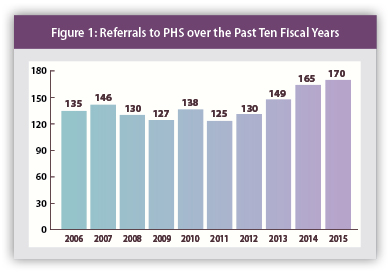 During the past year, PHS provided services aimed at improving physicians’ health, saving physicians’ lives and careers, and educating physicians, other health care professionals, and health care organizations about physician health and recovery. During the past year, 18 physicians successfully completed monitoring contracts.
During the past year, PHS provided services aimed at improving physicians’ health, saving physicians’ lives and careers, and educating physicians, other health care professionals, and health care organizations about physician health and recovery. During the past year, 18 physicians successfully completed monitoring contracts.
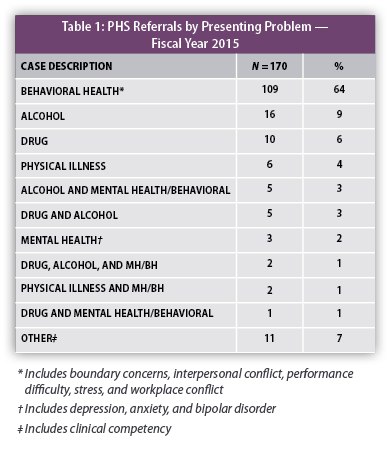 PHS addresses a broad range of physician health issues (listed by category in Table 1). Behavioral health continues to be the largest group (N=109), followed by substance use disorders (N=39). Physicians also presented with co-occurring mental health and substance use disorders and physical disabilities.
PHS addresses a broad range of physician health issues (listed by category in Table 1). Behavioral health continues to be the largest group (N=109), followed by substance use disorders (N=39). Physicians also presented with co-occurring mental health and substance use disorders and physical disabilities.
The referrals for behavioral health include interpersonal conflicts and other similar issues such as performance complaints and difficulty completing medical charting. These assessments have resulted in diagnoses of attention disorders, learning issues, executive function issues, and physical illness such as sleep disorders. PHS recommendations following these assessments included therapy, specialized treatment, professional coaching, educational courses, clinical remediation and/or monitoring.
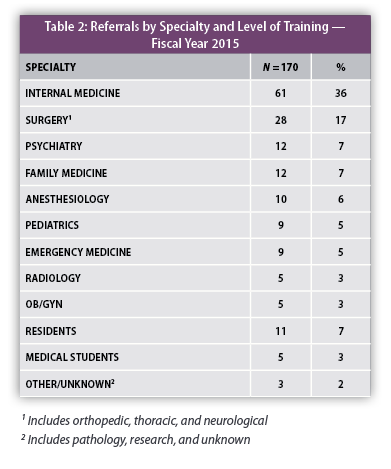 PHS continues to serve a spectrum of physician specialties, including residents and medical students, as shown in Table 2.
PHS continues to serve a spectrum of physician specialties, including residents and medical students, as shown in Table 2.
PHS has directly helped over 2513 physicians since its inception over 35 years ago.
PHS has been interested to see whether any particular specialties are significantly overrepresented or underrepresented in our client population. Accordingly, Table 3 shows percentages of each specialty for PHS clients (N=170) versus all Massachusetts physicians (N=xx). The left hand side of the table represents the current year (FY 2015); the right hand side represents combined years FY 2011–2014.
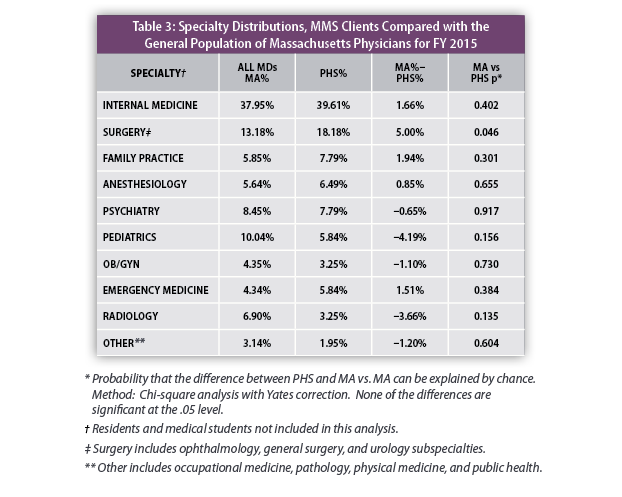
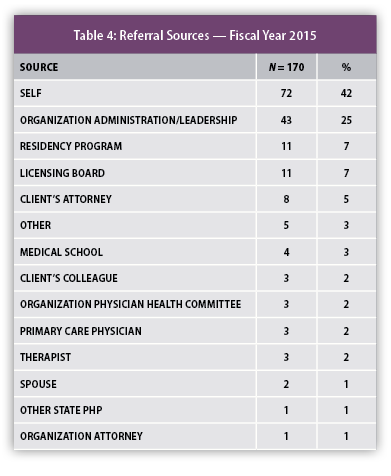 PHS is also pleased that accessibility and confidentiality protections result in a broad range of referral sources, with hospital administration, and self-referrals being the highest (see Table 4).
PHS is also pleased that accessibility and confidentiality protections result in a broad range of referral sources, with hospital administration, and self-referrals being the highest (see Table 4).
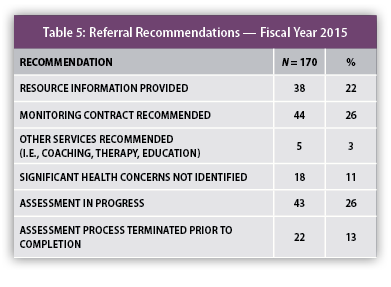
Table 5 represents a snapshot of where the FY15 referrals were at the end of the fiscal year.
Support Groups
For physicians, medical students, and residents seeking support from other physicians in recovery, PHS coordinates several weekly confidential physician support group meetings throughout the state. Contact PHS at (781) 434-7404 for more information about these meetings. Some groups require meeting with a facilitator before attending the first meeting. As always, contact and involvement with PHS is confidential.
PHS Support Group List
- Monday and Thursday Support Group — This facilitated group sponsored by PHS follows AA guidelines and is held on Mondays and Thursdays at 7:00 p.m. in Waltham.
- First and Third Wednesday Support Group (as well as the Fifth Wednesday when applicable) — This group is open to spouses and significant others in addition to the physician. It is sponsored by PHS and meets on the first and third Wednesday of each month from 7:00 to 8:30 p.m. in Waltham.
“The Physician Health Services support group is where members bring their successes, fears, concerns, and occurrences unique to life as a physician. They encourage each other to stand fast, to grow and learn from whatever happens in the hospital, their practice, or elsewhere. They help each other tolerate trouble and move on. It is a privilege to be their facilitator.”
— Diana Barnes Blood, Support Group Facilitator
- Physician Health Support Group (second and fourth Wednesday and fourth Monday) — This three-times-per-month behavioral health support group meeting sponsored by PHS is designed to respond to the needs of physicians, residents, and medical students experiencing the rigors of medicine who might benefit from collegial support. The focus is on strengthening the ability to effectively deal with patients, employers, hospitals, coworkers, colleagues, peers, family members, and significant others. The group meets on the second and fourth Wednesday and fourth Monday of each month from 6:30 to 7:45 p.m. in Waltham.
- Greenfield Group — This group meets on Wednesdays from 7:00 to 8:00 p.m. in Greenfield.
- Tuesday Evening Support Group — This group meets from 7:00 to 8:00 p.m. in Falmouth.
- Faith-Based Support Group — This weekly men’s group, affiliated with the Vineyard Christian Fellowship of Greater Boston, provides support to professionals and others within a faith-based context. The group meets on Thursdays from 8:00 to 9:30 p.m. in Brookline.
- Worcester Monday Doctors’ 12-Step Group — This group is open to any doctoral-level health care professional with substance use concerns. It meets every Monday from 7:30 to 8:30 p.m. in Worcester.
- Health Care Professionals Recovery Group — This weekly meeting is a self-help-format support group open to any licensed health care professional. The group meets every Tuesday from 7:00 to 8:00 p.m. in Pittsfield.
In addition to the above support groups, a list of AA meetings is available from AA Central Service, 368 Congress Street, Boston, (617) 426-9444. PHS can provide information on a number of other professional and secular peer-support groups as well.
Monitoring Program
Monitoring Contracts/Agreements Available to Physicians
Our Substance Use and Behavioral Health Monitoring Contracts help guide physicians and medical students in recovery. PHS also has an Occupational Health Monitoring Agreement to assist physicians who need assistance with workplace challenges. These Contracts and Agreement serve as tools for supporting physicians, documenting their progress and recovery and helping physicians thrive in and/or return to the practice of medicine. The success of our program is not only dependent on the physicians who willingly participate, but also on the countless physician volunteers who are instrumental in making our peer-support network and monitoring contracts successful.
Drug testing is one component of the PHS Substance Use Monitoring Contract. PHS drug test collection procedures are based on validated National Institute on Drug Abuse (NIDA) standards. Collections are primarily performed at Quest Diagnostics Laboratory Collection Centers. In regions where such centers are limited, PHS seeks the assistance of volunteer physician test monitors. All test monitors (including Quest Diagnostics Laboratories Collection Centers) are provided with procedural guidelines for collections and are trained to follow them. Numerical identification badges are issued to physicians and medical students in the program in order to ensure proper identification while maintaining confidentiality.
Substance Use Monitoring Contract
This contract is a minimum of three years in length and is designed to guide and document abstinence from substances of abuse. Components of the contract include, but are not limited to, face-to-face monthly meetings with an associate director, attendance at support group meetings, participation in random drug testing, and regular contact with a therapist, work monitor, and chief of service.
Behavioral Health Monitoring Contract
PHS developed the behavioral health monitoring contract to address mental and behavioral health issues resulting from stress, emotional problems, and mental illness. The contract duration is a minimum of two years and includes, but is not limited to, monthly meetings with an associate director, regular attendance at a support group meeting, and regular contact with a therapist, work monitor, and chief of service.
Extended Voluntary Monitoring Contracts
These contracts are available to participants who have successfully completed a substance use or behavioral health monitoring contract and choose to participate in extended monitoring. The contract includes regular but less frequent contact with an associate director and therapist and ongoing participation in random drug testing when indicated.
Occupational Health Monitoring Agreement
This new type of monitoring agreement has been developed for physicians who are experiencing “problematic workplace behavior” that does not appear related either to substance use or to a major psychiatric condition. Often, the manifestation of such behavior stems from interpersonal problems in the work environment, and it does not rise to the level of intervention required by more substantial health concerns. When a physician is referred for problematic workplace behavior and no psychiatric/substance use disorder can be identified, a one-year Occupational Health Monitoring Agreement may be recommended which involves four parties, including the workplace, the client, a professional coach, and PHS. It includes regular meetings with the coach and a PHS associate director, a workplace monitor, and chief of services, as well as agreed-upon coaching goals that would also be featured in a coaching agreement between the coach and the physician.
Medical Student Contracts
With the help of the Medical Student Advisory Committee, PHS created contracts designed to meet the specific needs of medical student participants. The Medical Student Substance Use Monitoring Contract and the Medical Student Behavioral Health Monitoring Contract largely mirror the corresponding physician contracts, but identify at least two monitors within the academic environment best suited to oversee and guide the medical student’s compliance with the PHS monitoring program. Like the physician contracts, student monitoring includes monthly meetings with an associate director, regular attendance at support groups, regular contact with a therapist, and random drug testing for substance use monitoring. In the event of any noncompliance, the dean of the medical school rather than the Board of Registration in Medicine becomes involved to help address the identified concerns.
To Volunteer
If you are interested in assisting PHS by serving as a monitor to a colleague in your hospital or practice, please call PHS at (781) 434-7404.
The monitoring program is designed to support the recovery process for physicians and medical students and to help assure the safe practice of medicine.
PHS would like to extend special thanks to the physicians who have supported their colleagues by serving as volunteer monitors. Please encourage your colleagues to assist PHS in this capacity.
Seeking Volunteer Monitors to Support Physicians in Need
The assistance and support volunteer monitors provide to their colleagues is an essential element of each PHS contract and contributes to the recovery of the contracted physician. Workplace monitors, test monitors, and hospital chiefs of service are asked to participate in physician monitoring and provide ongoing support to their fellow physicians and information to the program. PHS dedicates resources to ensure monitors are provided with information that outlines the important details of the role they play in the contracting physician’s recovery.
Quality Improvement
PHS recognizes its accountability to physicians and the community and strives to assure continuous assessment of and improvement in the quality of the program. Quality improvement is part of an ongoing process for evaluating and improving the quality of the support and monitoring activities of the program.
The purpose of PHS’s quality improvement is as follows:
- To identify and monitor critical aspects of the support and monitoring services
- To focus attention on administrative and clinical processes that affect outcomes
- To resolve identified problems, improve services, and evaluate the effectiveness of the services
Monthly Meeting Requirement
PHS examined the monitoring requirement of monthly face-to-face meetings with clients, and the documentation shows 99.2% compliance (283 expected monthly meetings). Of the four meetings that were missed, there was no documentation to explain. PHS will look to ensure 100% documentation explaining the circumstances for all missed meetings.
Physical Examinations
PHS requires each physician with a monitoring contract to select a primary care physician. The participant undergoes a physical examination, makes the primary care physician aware of the circumstances, and enlists his or her assistance in providing treatment. PHS reviewed compliance with meeting this requirement of the physicians enrolled in the monitoring program over the past year. It was determined that the requirement was fulfilled 96.3% of the time. One physician was noncompliant with the requirement and closed their contract prior to completion review. This finding reveals a significant increase in compliance from last year.
Quarterly Reports
For each physician monitored under a PHS contract, both the physician and his or her monitors are mailed a quarterly report form for feedback. This includes a self-report from the client detailing therapy, support group, and associate director meeting attendance. Monitors include a workplace or colleague monitor, a chief of service (if applicable), and a therapist and/or psychiatrist. Additional monitors may be indicated for individual circumstances. These forms are mailed to monitors each quarter and are due within 20 to 30 days. Clients and the respective monitors who do not respond are sent reminder notices. All reports are received, reviewed, and entered into a tracking database system. PHS reviewed data for the fourth quarter of 2014. A total of 492 reports were sent out for feedback. Of these, 448, or 91.1%, were received following reminder notices. A total of 485 or 98.6% were received following associate director intervention. Ultimately, 485 or 98.6%, were received. Seven reports were considered uncollectable or not needed. Five physicians were reported to the licensing board for delayed reports.
Positive Test Reporting
PHS monitoring contracts for substance use require that all positive tests be reported to the Board of Registration in Medicine (BRM) and other parties, including the workplace. The physician understands this requirement, and PHS provides additional assessment information regarding the circumstances of the test results. It is our goal to be efficient at PHS in our review of test results, which includes assessment by a medical review officer so positive tests are reported in a timely manner. PHS examined the timeframe between when the results are received by PHS for review until a verbal report is made to the BRM. From January to December 2014, there were 14 confirmed positive test results that were reported to the BRM. Of the 14 positive results, one result was that of a medical student, and a report was made to the medical school and not the Board of Registration in Medicine. Of the remaining 13 positive results, PHS determined an average 1 day timeframe from the time the result was received to the time a report was made to the BRM and other relevant parties.
